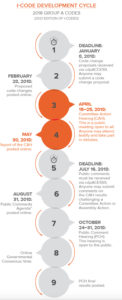 Proposed changes to codes governing tent installations will be taken up at the April ICC Committee Action Hearing.
Proposed changes to codes governing tent installations will be taken up at the April ICC Committee Action Hearing.
IFAI’s Tent Rental Division (TRD) submitted two proposals for changes in codes that relate to tent installation as part of the Group A I-Code Development Cycle for the 2021 Model Code.
Code proposals were due to the International Code Council (ICC) in January. A monograph of all proposals was set to be published after the deadline for this issue of InTents. TRD’s two proposals, as well as proposed code changes from other
parties, are available now for review on the ICC’s website at www.iccsafe.org.
TRD has hired Paul Armstrong, P.E., C.B.O., as a consultant for the current code cycle. Introduced to TRD members in January at Tent Conference 2018 in Phoenix, Ariz., Armstrong has provided expertise in both residential codes and building codes for California and in international codes as an independent consultant, technical trainer and expert witness for more than a decade.Armstrong will also provide consultation services in this code cycle for IFAI’s Professional Awning Manufacturers Association (PAMA) and Fabric Structures Association (FSA).
TRD’s code change proposals address the certification and labeling of tent fabric for flame propagation and wind and anchoring requirements for temporary tents.
F238-18: Wind and anchoring requirements
This code proposal would replace the structural engineering requirements that passed for the 2018 Model Code (requiring site or engineering documentation for tents with 1,000-person occupancy and/or 7,500 square feet) with a table that sets minimum wind loads and documentation requirements based on length of installation, occupant load, square footage and number of stories.
On the proposed table, the smallest tents and occupancy loads with the shortest installation duration would need to be anchored to a minimum wind speed of 57 miles an hour. This would be the first time minimum wind speeds would be established for small tents (less than 800 square feet), a major new commitment for the tent industry. Knowing the wind load, installers will need to determine a generic anchoring plan based on soil conditions. Documentation requirements become more stringent with larger occupancies and square footage.
“The bigger it is, the better it’s got to be,” says TRD Code Committee chair Tom Markel, Bravo Events, Buffalo, N.Y.
“Unfortunately that will probably rule out the old West Coast frames or some of the larger party canopies or old party canopies
because they won’t be able to come up with engineering to prove that they can handle that wind speed.”
With the goal of increasing public safety with reasonable and enforceable requirements, TRD hopes that a tiered approach will take the sting out of increased costs of documentation and permitting.
“It’s still an uphill fight because it is not a simple proposal,” Markel says. “It is going to raise the bar for the industry, but not to the point where you need a structural engineer every time you put up a tent.”
F243-18: Flame propagation performance treatment
The goal of this code change proposal is to modernize the code to reflect current testing practices and the fact that today’s tent fabric is inherently fire retardant and does not require retreatment. The changes proposed to this code would:
- Update the code to reflect that tent manufacturers, rather than testing laboratories, provide the label and certification documentation.
- Require the label to match certification documents.
- Require that the affidavit and label name the manufacturer of the tent or air-supported structure and indicate either the last treatment of the fabric (date, chemical, person or firm treating the fabric, testing agency and testing standard) or that the material meets NFPA 701 test method 1 or 2 without treatment.
This proposal would neither increase nor decrease costs to the industry.
The International Code Council (ICC) uses a three-year cycle to develop model codes. Tents and temporary structures fall under the International Fire Code (IFC). The IFC is in Group A of this code cycle.
Proposed code changes that relate to tents will be taken up April 15–25 at the ICC Group A Committee Action Hearing in Columbus, Ohio. Anyone can attend and testify at this public hearing, although attendees do need to register. TRD encourages its members to attend this and all ICC hearings. For information and to coordinate with TRD efforts, contact Andrea Jauli, division supervisor, +1 651 225 6944, akjauli@ifai.com.
 TEXTILES.ORG
TEXTILES.ORG


